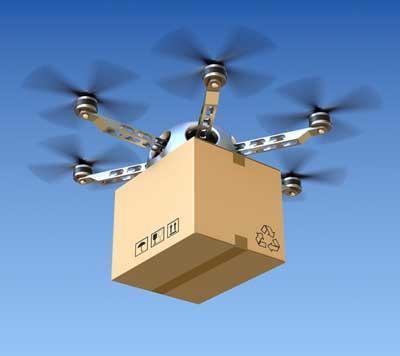
Plans to use drones to deliver packages to remote Scottish islands have been given a funding boost this week, along with eight other freight projects, which all aim to decarbonise freight and improve UK transport links.
A total of £1.2m of government funding will be shared between the nine freight projects. The finance comes from the government's £7m Freight Innovation Fund and the awards are part of the government’s wider Future of Freight Plan, which was launched last year to improve the UK’s freight system.
The nine winners of the first funding round include Skyports Deliveries, which will use its £150,000 award to operate drones to improve island-to-island connectivity in the Orkney Islands.
The company is partnering with Royal Mail and Loganair on the project, and aims to create an intermodal transport hub to improve island-to-island connectivity using drones to make deliveries.
An award of £150,000 has also been won by Bicester-based Electric Assisted Vehicles Ltd. The company in partnership with FedEx Express is developing a four-wheel, electrically assisted lightweight delivery vehicle as an alternative to petrol and diesel vans.
Roads Minister Richard Holden said: “Whether it’s drones for deliveries on remote islands or zero emission buggies – we want to invest in future technology that could transform how we move goods around the country while reducing emissions and traffic and creating skilled jobs.
“The Freight Innovation Fund gives innovators the opportunity to test their ideas and help our freight industry become greener and more efficient – unlocking better connectivity and boosting growth across the country.”
The awards also include London-based CurbCargo, which has been given £120,000 to finance a project using data to track the environmental impact of freight deliveries, which will prompt companies to change how they order products to reduce vehicle movements.
Read more
- Call for drones to deliver freight along the Thames to cut pollution
- <strong>Government launches £7m fund to help drive efficiencies in freight delivery</strong>
- BT Group invests £5m in new drone superhighway linking logistics hubs
Another winning team is Otaski Energy Solutions and Syselek Ltd, which is based in Gateshead and partnered with Costain.
Its £145,000 award will fund a trail of their cost and energy-efficient smart charge and bi-directional converter, which allows electric vehicles to charge from any power grid source and discharge energy back to the grid or storage.
The aim is to help create an intelligent vehicle fleet charging system that increases grid reliability, resilience and stability and high adaptations to variable loads.
Funding of £129,000 has gone to CocoonFMS Ltd, which is based in Lichfield, Staffordshire and is partnered with Simarco Worldwide Logistics.
The project will create a digital calculator to provide automated management of port costs and shipping expenses, providing more accurate invoice information to users, reducing port delays and improving planning of deliveries.
Suffolk-based Entopy, which is partnered with Fujitsu Services UK and Atamai Freight, will use its £145,000 award to create a digital twin of shipments to track them during their delivery, with the aim of providing information and supporting greater use of digital products in the freight sector.
The winning SMEs will also benefit from a freight innovation fund accelerator, which will provide bespoke business support to help them access private investment.
The nine winners will also be invited to join a “freight innovation cluster”, a community of innovators that will hold events, encourage collaboration and generate new opportunities, and stimulate growth within the wider freight sector.
Nicola Yates OBE, CEO at Connected Places Catapult, the UK’s innovation agency, said: “The freight sector has an enormous opportunity to support jobs and growth across the UK, which is why today we are pleased to welcome the nine SMEs to the first round of the Freight Innovation Fund Accelerator.
“Working with innovators and industry partners through our accelerator programme allows us to develop a pipeline of technology and new ideas that promise to help tackle the freight sector’s emerging needs, ensuring that resilience, efficiency and carbon reduction are core to the sector’s future.”













